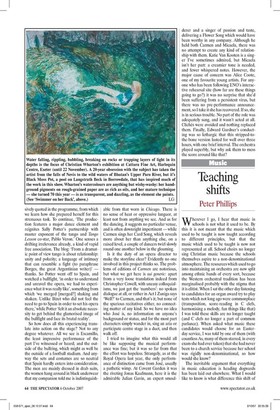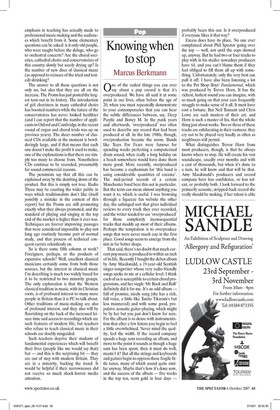Teaching shifts
Peter Phillips Wherever I go, I hear that music in schools is not what it used to be. By this it is not meant that the music which used to be taught is now taught according to different principles, but that the music which used to be taught is now not represented at all. School choirs no longer sing Christian music because the schools themselves aspire to a non-denominational atmosphere. The resources which used to go into maintaining an orchestra are now split among ethnic bands of every sort, because the Western orchestral tradition has been marginalised probably with the stigma that it is elitist. When I sat the other day listening to candidates for an organ award try to play tests which not long ago were commonplace (transposition, score-reading in C clefs, harmonising a melody, fun things like that) I was told these skills are no longer taught (and C clefs no longer a part of common parlance). When asked what music these candidates would choose for an Easterday service, I was told by one of them (with countless As, many of them starred, in every exam she had ever taken) that she had never been to a church service because her school was rigidly non-denominational, so how would she know?
The inevitable argument that everything in music education is heading dogwards has been laid out elsewhere. What I would like to know is what difference this shift of emphasis in teaching has actually made to professional music-making and the audiences which benefit from it. Some elementary questions can be asked: is it only old people, who were taught before the deluge, who go to orchestral concerts? Are the choral societies, cathedral choirs and conservatoires of this country slowly but surely drying up? Is the number of new discs of classical music (as opposed to reissues of the tried and tested) shrinking?
The answer to all these questions is not only no, but also that they are all on the increase. The Proms has just posted the largest turn-out in its history. The introduction of girl choristers in many cathedral choirs has boosted numbers while the future of the conservatoires has never looked healthier (and I can report that the number of applicants to Oxford and Cambridge in the recent round of organ and choral trials was up on previous years). The sheer number of classical CDs available at the moment is bewilderingly large, and if that means that each one doesn't make the profit it used to make, one of the explanations is that there are simply too many to choose from. Nonetheless CDs continue to be recorded, presumably for sound commercial reasons.
The pessimists say that all this can be explained away by the dumbing down of the product. But this is simply not true. Radio Three may be courting the wider public in ways which traditionalists don't like (itself possibly a mistake in the context of this report) but the Proms are still promoting exactly what they always promoted, and the standard of playing and singing at the top end of the market is higher than it ever was. Techniques are forever improving: passages that were considered impossible to play not long ago routinely become part of normal study, and that process of technical conquest carries relentlessly on.
So is there some fifth column at work? Foreigners, perhaps, or the products of expensive schools? Well, excellent classical musicians certainly come from both those sources, but the interest in classical music I'm describing is much too widely based for it to be restricted to two minority groups. The only explanation is that the Western classical tradition in music, with its Christian roots, is of profound interest to many more people in Britain than it is PC to talk about. Other traditions of music-making are also of profound interest, and they also will be flourishing on the back of the increased leisure time and access to recordings which are such features of modern life; but teachers who refuse to teach classical music in their schools are doubly misguided.
Such teachers deprive their students of fundamental experiences which will benefit their lives (people like me would say that) but — and this is the surprising bit — they are out of step with modern Britain. They are in a minority, bucking the trend. It would be helpful if their narrownesses did not receive so much shock-horror media attention.






























































 Previous page
Previous page